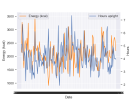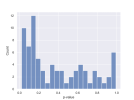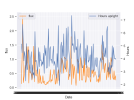About a month ago I started eating a paleo, whole foods type diet. Basically, unprocessed plants and animals apart from cooking. I'm logging the weight of every food I eat in an app called Cronometer. For most packaged or processed foods, it has the nutrition information from the label - so just the basics seen on most US labels: macronutrients and around five or six micronutrients.
But the cool thing is that the app also has entries pulled from the University of Minnesota NCC Food and Nutrient Database which has detailed micronutrient data for thousands of "foundational" foods, as in most fruits, vegetables, nuts, meats you would typically find at a grocery store - around 70-80 nutrients for most foods. (Also has a good number of brand name and restaurant foods.)
Starting three days ago, I decided to only eat foods which have this comprehensive nutrition information. Which is basically most of the foods I was already eating, but I'm just going to exclude bags of mixed frozen vegetables from now on, and buy them packaged separately.
Here's two days ago, an example of the foods I eat:

And an example of micronutrient details. This is for 629 grams of baked potato:

So the experiment. I'm going to track the nutrition data for probably at least six months.
First hypothesis I've come up with: Amounts of some micronutrients will inversely correlate with calories eaten the same day or the next day. In other words, that the intake of certain micronutrients dictates my hunger to some extent. If I am eating very little of something, for example copper, my body would make me more hungry in an attempt to increase my intake of copper, and vice versa.
Second hypothesis, but which I can't yet start: Amounts of some micronutrients will correlate to my physical activity and body position.
Chris Armstrong of OMF, in another thread, posted that they might use a device called an activPAL for tracking body position in future studies. It is stuck to the thigh and tracks its orientation to determine the wearer's position. If the sensor/thigh is vertical, the person is standing. Horizontal - the person is sitting or lying down. And I think it tracks if the person is walking as well.
I really want some kind of device like this. My main symptoms are related to physical and mental energy. I can't think of any objective measurement for mental energy (edit: potentially I could do some cognitive tests, but they require significant energy to do on a consistent basis), but this seems like a fairly accurate indicator of how much physical energy I have. I definitely spend more time lying down the more tired I am. Steps are kind of a proxy for physical energy, and I can track that with my phone, but for me I pretty much only walk for things I have to do: grocery stores, work, cooking. It doesn't vary too much based on my energy. But the amount of time I spend sitting up or standing is more based on how energetic I feel.
I don't think any devices like this are available for consumer use, at least accurate ones. activPAL is made for researchers. I tried messaging them about the possibility of purchasing a single device for personal use, but they didn't respond.
So I'm planning to try to make my own. I still have to educate myself more on some of the required technologies, but the basic concept isn't too complicated. It'll be a microcontroller with an accelerometer on my thigh, and a wire will go up to another accelerometer on my chest. Each accelerometer provides its own physical orientation in three axes. The chest one is so that I can also discriminate between sitting and lying down.
The microcontroller, basically a tiny computer, will continuously take that combined data, do a little math to get my body's position, and log the timestamped position in an attached SD card so that I can analyze it later.
I also want it to track steps, including whether it was a step on level ground, going up a stair, or down a stair. I'm guessing this will require some machine learning on the accelerometer data. I'm not sure if it's too hard a task for me, but it doesn't seem like it should be. I think the algorithms for step counting in smart watches can be complicated, but the wrist is also a hard place to accurately track what the legs are doing. I think it might be easier if the device is on the thigh.
This device might take a while to build though. I'm doing short bursts of learning in each technology I'll require: electronics, machine learning, 3D design (for the case for the device), and a couple other things. Cycling through each subject, so around 30 minutes on electronics one day, 30 minutes on machine learning the next, etc. Doesn't feel as overwhelming as doing the same thing every day.
Anyway, if anyone has any thoughts, or suggestions for how I could improve these ideas, I'm all ears.
But the cool thing is that the app also has entries pulled from the University of Minnesota NCC Food and Nutrient Database which has detailed micronutrient data for thousands of "foundational" foods, as in most fruits, vegetables, nuts, meats you would typically find at a grocery store - around 70-80 nutrients for most foods. (Also has a good number of brand name and restaurant foods.)
Starting three days ago, I decided to only eat foods which have this comprehensive nutrition information. Which is basically most of the foods I was already eating, but I'm just going to exclude bags of mixed frozen vegetables from now on, and buy them packaged separately.
Here's two days ago, an example of the foods I eat:
And an example of micronutrient details. This is for 629 grams of baked potato:

So the experiment. I'm going to track the nutrition data for probably at least six months.
First hypothesis I've come up with: Amounts of some micronutrients will inversely correlate with calories eaten the same day or the next day. In other words, that the intake of certain micronutrients dictates my hunger to some extent. If I am eating very little of something, for example copper, my body would make me more hungry in an attempt to increase my intake of copper, and vice versa.
Second hypothesis, but which I can't yet start: Amounts of some micronutrients will correlate to my physical activity and body position.
Chris Armstrong of OMF, in another thread, posted that they might use a device called an activPAL for tracking body position in future studies. It is stuck to the thigh and tracks its orientation to determine the wearer's position. If the sensor/thigh is vertical, the person is standing. Horizontal - the person is sitting or lying down. And I think it tracks if the person is walking as well.
I really want some kind of device like this. My main symptoms are related to physical and mental energy. I can't think of any objective measurement for mental energy (edit: potentially I could do some cognitive tests, but they require significant energy to do on a consistent basis), but this seems like a fairly accurate indicator of how much physical energy I have. I definitely spend more time lying down the more tired I am. Steps are kind of a proxy for physical energy, and I can track that with my phone, but for me I pretty much only walk for things I have to do: grocery stores, work, cooking. It doesn't vary too much based on my energy. But the amount of time I spend sitting up or standing is more based on how energetic I feel.
I don't think any devices like this are available for consumer use, at least accurate ones. activPAL is made for researchers. I tried messaging them about the possibility of purchasing a single device for personal use, but they didn't respond.
So I'm planning to try to make my own. I still have to educate myself more on some of the required technologies, but the basic concept isn't too complicated. It'll be a microcontroller with an accelerometer on my thigh, and a wire will go up to another accelerometer on my chest. Each accelerometer provides its own physical orientation in three axes. The chest one is so that I can also discriminate between sitting and lying down.
The microcontroller, basically a tiny computer, will continuously take that combined data, do a little math to get my body's position, and log the timestamped position in an attached SD card so that I can analyze it later.
I also want it to track steps, including whether it was a step on level ground, going up a stair, or down a stair. I'm guessing this will require some machine learning on the accelerometer data. I'm not sure if it's too hard a task for me, but it doesn't seem like it should be. I think the algorithms for step counting in smart watches can be complicated, but the wrist is also a hard place to accurately track what the legs are doing. I think it might be easier if the device is on the thigh.
This device might take a while to build though. I'm doing short bursts of learning in each technology I'll require: electronics, machine learning, 3D design (for the case for the device), and a couple other things. Cycling through each subject, so around 30 minutes on electronics one day, 30 minutes on machine learning the next, etc. Doesn't feel as overwhelming as doing the same thing every day.
Anyway, if anyone has any thoughts, or suggestions for how I could improve these ideas, I'm all ears.
Last edited:



